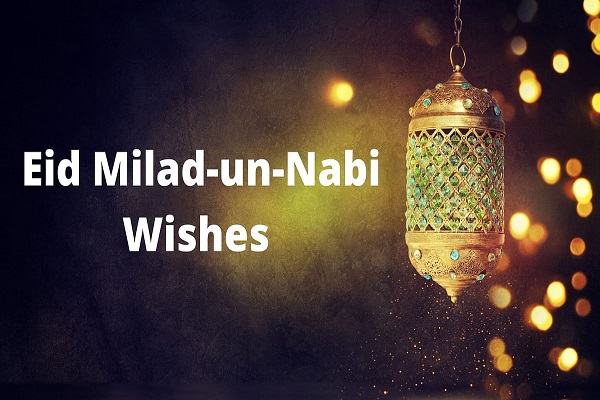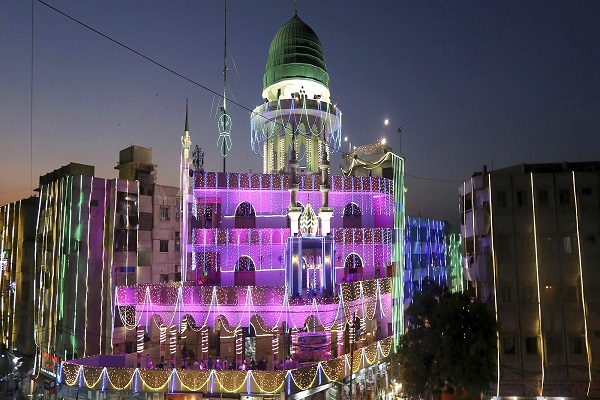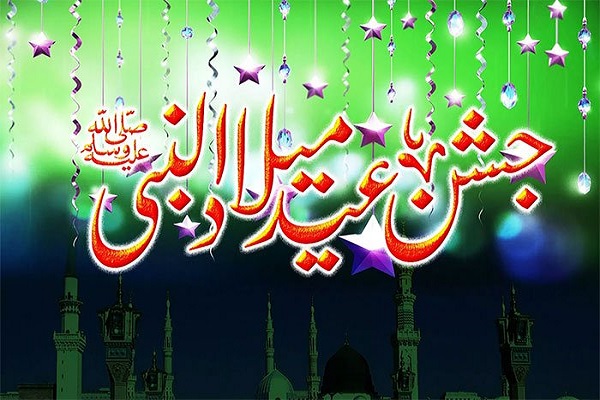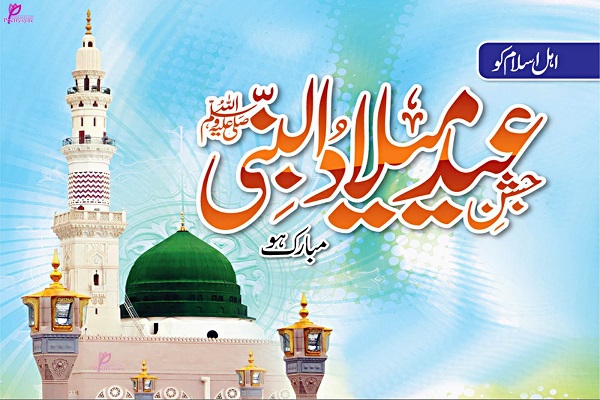Eid Milad-ul-Nabi is observance and celebration of the birthday of beloved Prophet Muhammad (P.B.U.H.), commemorated in Rabi’s al-Awwal, the 3rd Islamic month. The majority of Sunni scholars consider the 12th Rabi’ al-Awwal as the birth date while Shia scholars consider the 17th Rabi’ al-Awwal as a birth date.
In West Africa, the term Maouloud is used for the Holy Prophet’s birth (P.B.U.H.). The celebration history dates back to the early era of Islam, where Tabi’un (successors) started to conduct meetings in which songs and poetry written to honor Prophet Muhammad (P.B.U.H.) were sung and recited to huge crowds. This article has all the information including Eid Milad-ul-Nabi History.
| Title | Description |
|---|---|
| Details | |
| Type: | Islamic |
| in Urdu: | عیدمیلادالنبی صلی اللہ علیہ وسلم |
| Date: | 12 Rabi Al-Awwal |
| Location: | Pakistan |
| Information | |
| Also Called: | 12 Rabi-ul-Awal |
| Observed By: | Muslims |
| Significance: | Birth of Hazrat Muhammad (SAW) |
| Name: | Eid Milad-ul-Nabi |
| Other Name: | Eid Milad-un-Nabi, Jashan-e-Viladat, Jashan-e-Eid Milad-un-Nabi |
| People Donate: | Food, Sweets, etc |
| Naat: | Poetry Written and Recites in Praise of the Prophet Muhammad (SAW) |
| Shed Light on : | Prophet Muhammed’s Life, Sayings, Teachings, and Philosophies |
| Competitions of : | Recitation |
| Offer Prayers At: | Mosques, Schools, Colleges, Houses |
Table of Contents
Origin of word Milad
Mawlid’s word originated from an Arabic word ‘ولد’ meaning descendant, to give birth, conceive a child. In current usage, this term means observance of Prophet Muhammad’s (P.B.U.H.) birthday.
Conflicts on Date
The majority of Sunnis and few Shias accept that Muhammad (P.B.U.H.) was born on12th Rabi-al-Awwal. On the other hand, Imamiyyah Shia says that the 17th Rabi-al-Awwal is the Prophet’s date of birth. It’s a matter of disagreement or Ikhtilaf since few Shiite scholars like al-Thani, Saduq, and Kulayni have confirmed the 12th Rabi-al-Awwal. Other scholars view that the exact date of birth is not known and is not recorded in Islamic traditions.
Eid Milad-ul-Nabi History
In the initial era of Islam, Muhammad’s birthday (P.B.U.H.) was celebrated privately as a sacred day. Later, the number of people to Mawlid house increased, and the home was kept open for the whole day for celebration. The primary commemoration included torchlight processions, animal sacrifices, feasts, and public sermons.
These celebrations were arranged during the day compared to contemporary celebrations. Importance was given to ‘Ahl-al-Bayt’ with recitations of the Quran and presentation of Islamic sermons.
Findings of the Encyclopedia
It is not possible to trace the exact origin of Mawlid. According to ‘Muhammad in History, Thought & Culture: An Encyclopedia of the God’s Prophet,’ Muhammad (P.B.U.H.) fasted on Monday stating that this was his birthday and Omar considered that the birth of Muhammad is possibly a starting time for the Islamic calendar.
Abbasids 1st introduced Mawlid in Baghdad. It is mentioned that Al-Khayzuran Bint Atta of Abbasids 1st formalized Mawlid. Ibn Jubayr wrote that the birthday of Muhammad (P.B.U.H.) was celebrated every Monday of the 3rd Islamic month Rabi’ al-Awwal.
The Hypothesis of Nico Kaptein
According to Nico Kaptein’s hypothesis Fatimids initiated Mawlid. The idea of Mawlid celebration originated with the Fatimid dynasty is universally accepted today among secular and polemicists’ scholars. According to Annemarie Schimmel’s celebration of Muhammad’s birthday on a festive and larger scale emerged 1st in Egypt.
The Maqrizi, an Egyptian historian, tells that a celebration was arranged in 1122 in which primarily religious and scholars participated. They heard speeches, distributed honey, and different sweets.

Public Holiday
Muzaffar al-Din Gokburi stated the 1st public annual festival of Milad in Erbil (Presently Iraq). Muzaffar was a brother-in-law of Salah ad-Din, and the festival soon started to prevail in the Islamic world. Since Gokburi and Salah ad-Din were both Mystics and celebration became immensely popular and well-celebrated among the Sufi devotees still in practice.
Mawlid Texts
The term Milad refers to the birth celebration of the Prophet (P.B.U.H.). Besides this, it also refers to a text recited and composed for the nativity celebration of Muhammad (P.B.U.H.) or the text sung or recited on a birthday. These poems were written in several dialects, including Turkish, Kurdish, and Arabic.
These texts are composed of the life of the Prophet. Some chapters of his (P.B.U.H.) are summarized below:
- Muhammad’s Ancestors
- Muhammad’s Conception
- Muhammad’s Birth
- Halima’s Introduction
- The orphanhood of Muhammad
- Al-Isra’
- The Hijra
- 1st converts to religion Islam
- Al-Mi’radi
- Al-Hira 1st revelation
- 1st trip of the nephew of Abu Talib
- Marriage arrangement between Khadija and Muhammad
- Death of Muhammad
Countries Celebrating Milad
All Muslim countries celebrate Milad and other countries where most Muslim populations live, such as the U.K., Sri Lanka, Nigeria, France, Jordan, Italy, Iran, Iraq, Libya, Canada, Russia, and Morocco Maldives, Germany, Ethiopia, and India. The only countries which don’t observe Milad are Saudi Arabia and Qatar.
Milad is forbidden in these two countries, and no official holiday is given to the public. In the last decades of the twentieth century, a trend rose to discredit or prohibit Milad in the Sunni-Muslim world.
Milad Celebration in Turkey
Turkish people celebrate Milad as a public holiday and recite poems about Muhammad’s life in houses and mosques.
Eid Milad-ul-Nabi Celebrations
In some countries Sufi orders organize and celebrate Milad in a festival manner, mosques or homes are decorated, and grand street processions are arranged. Food and charity are distributed, and children recite poetry to tell stories about Muhammad’s life. Poets and scholars recite Qasida al-Burda Shareef, the popular poem by thirteenth-century Sufi Busiri.

Celebration by Muzaffar
Muzaffar celebrated the 1st Sunni Milad celebration and arranged the slaughtering of many animals for a feast known to have a cost of three lac dirhams.
Celebration in Pakistan
The Milad celebration in Pakistan begins with a twenty-one-gun salute at provincial capitals and a thirty-one-gun salute in Islamabad.
Celebration in Indonesia
In different Indonesia regions, Milad celebrations are less lively, only two Islamic holidays, i.e., of Eid-ul-Adha and Eid-ul-Fitr, are celebrated.
Celebration in Tunisia
In Tunisia, Muslim individuals chant and sing hymns to praise Muhammad (P.B.U.H.) greeting his birth. In Tunisia, individuals make a desert named Assidat Zgougou to commemorate Milad.
Celebration in India
India, a non-Muslim country, is recognized for its Milad festivities. After morning prayers in Jammu & Kashmir Muhammad’s relics are displayed at Hazratbal Shrine.
Eid Milad-ul-Nabi Views
Favor
The legality of Milad is a debatable topic among Muslim scholars. The majority of Sunni and almost all Shia scholars favor Milad celebration while Ahmadiyya, Deobandi, and Salafi scholars are against celebrations. They consider Milad as Biddah.
Views of Scholar Jalal-ud-Din
Sunni Ulema who allowed Milad include a Shafi’i scholar Jalal-ud-din. As a scholar, he authored a fatwa regarding Milad that became an essential text on this topic. Though he was a renowned figure outside Egypt, he got involved in conflicts in Egypt throughout his life.
For example, he believes that he is the most important and competent scholar of his era, and demands to be recognized as Mujaddid and mujtahid. These demands and beliefs led him to appear as a controversial figure. His fatwa however received worldwide approval and didn’t provoke conflicts.
He explained that:
In my opinion legality of the Milad celebration-when consists of people’s gatherings, Quran recitation, wonders that happened during the Prophet’s birth, an arrangement of a banquet to serve food, is a good task. And one would be rewarded for paying honor to Prophet (P.B.U.H.) and expressing joy on his birth.
Views of Scholar Al-Suyuti
Al-Suyuti believes that Milad could be celebrated considering that Muhammad (P.B.U.H.) had sacrificed for his birth after becoming Prophet.

Views of Scholar Ibn-Hajar
A Shafi’i scholar Ibn-Hajar also approved Milad and said that: To celebrate Milad, one should do the acts ordered in the Quran like food distribution, poems recitation in Prophet’s praise, and self-discipline that would motivate them to do good and noble deeds.
Sunni Scholars in Favor of Milad
In Muslim countries, Sunni scholars favor Milad. Examples include Yousaf al-Qaradawi, Muhammad Alawi al-Maliki, Ali Gomaa, Muhammad Tahir-ul-Qadri, Zaid Shakir, and Habeeb Ali al-Jafri.
Opposition
The position of Taqī ad-Dīn Aḥmad on Milad has been mentioned as complex and paradoxical by some scholars. He stated Milad as a Biddah and criticized all those who celebrate Milad declaring it a resemblance to the birthday celebration of Jesus by Christian. He also recognized that Muslims celebrate Milad to express reverence and love for the Prophet (P.B.U.H.) and desire to reward.
Views of Salafi Scholar
The Salafi scholar didn’t accept Milad. Maliki, an Egyptian school of thought, considered Milad a blameworthy and self-invented addition that was haram or makruh.
Views of Scholar Al-Fakihani
Al-Fakihani stated that this concept is not described in the Holy Quran nor the Prophet’s Sunnah. He called it a Bidah initiated by idlers. He further noted that it wasn’t permitted, worthy, or compulsory, so it was forbidden or reprehensible.
Views of scholar Ibn al-Haj
Ibn al-Haj also declared Milad as a self-inventory and blameworthy invention that was haram or makruh. He added that Salaf never practiced Milad.
Views of scholar Abu Abd al-Haffar
Abu Abd al-Haffar also opposed Milad stating that Sahaba never celebrated Milad and in case if they had observed it then why its exact date is unknown.
Views of scholar Abd al-Aziz ibn Baz
Abd al-Aziz ibn Baz also opposed Milad stating that many worthy and holy occasions happened in Muhammad’s life. Still, he never celebrated them like hijra, night journey, and revelation of 1st Quranic verses.
Criticism by Education Minister
In 1934 education Minister of Egypt criticized useless stories that filled Milad poetry. He believed that those stories were not compatible with the scientific and modern viewpoint that portrayed Muhammad (P.B.U.H.) on a sober level.

Views of scholar Muhammad Ibn-al-Hajj
Muhammad Ibn-al-Hajj appreciated arranging ceremonies and expressing gratitude and love during the celebration, but he objected to the reprehensible and forbidden acts. He objected performance of singers on instruments considering it blameworthy. He questioned the connection between these instruments and the birth of the Prophet (P.B.U.H.).

